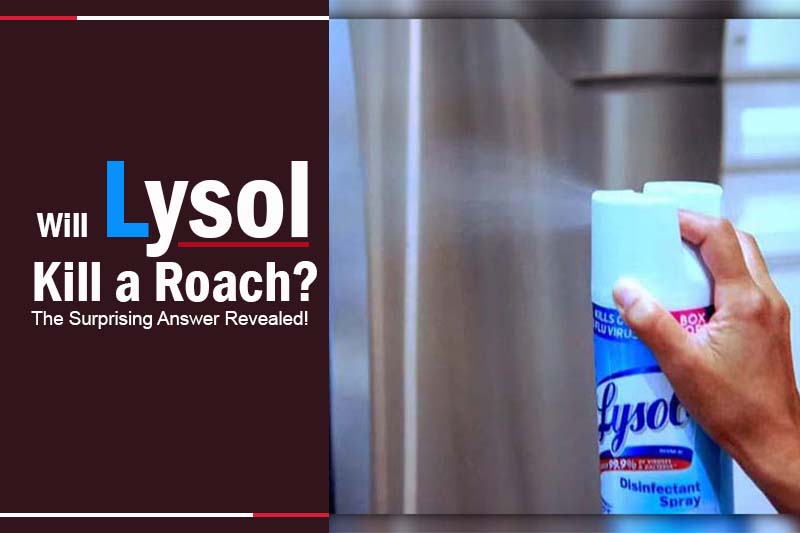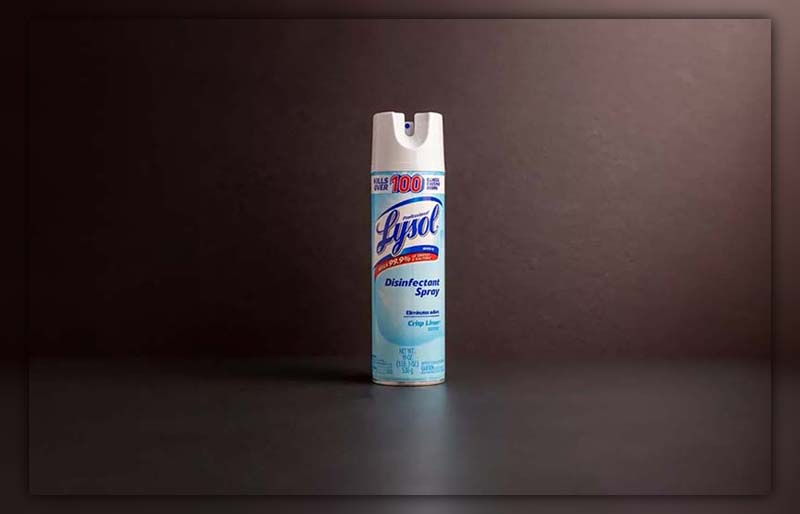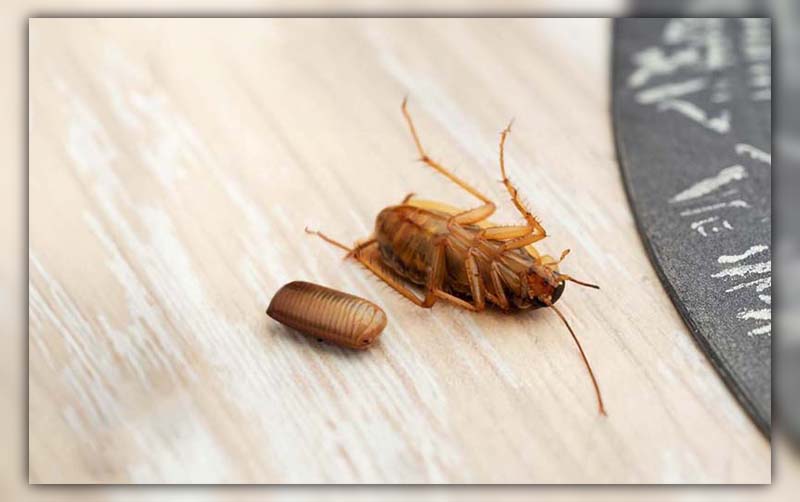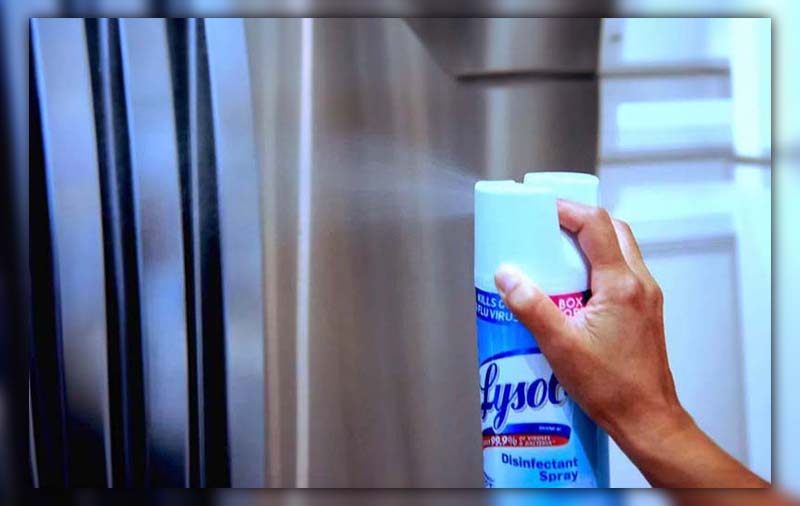Roaches have a notorious reputation for invading our spaces and proving tough to eliminate.
Amidst the myriad of solutions, a surprising contender has emerged from our cleaning cabinets.
Will Lysol kill a roach? Let’s explore our comprehensive guide to uncover the answer and arm yourself with unexpected knowledge.

Will lysol kill a roach?
Indeed, Lysol can effectively kill roaches. However, it’s essential to spray it directly onto the roach or ensure they come into direct contact with the solution.
Lysol’s active ingredients block the roach’s respiratory pores, leading to suffocation and death.
Does lysol kill cockroach eggs?
Absolutely! According to a study published in the Journal of Economic Entomology, Lysol detergent applied directly to cockroach egg cases resulted in 100% mortality of the eggs and unhatched nymphs inside.
The alkyl dimethyl benzyl ammonium saccharinate in Lysol can permeate the egg case and disrupt embryo development. Lysol also helps dissolve the outer oothecal membrane over time, allowing the disinfectant solution direct access to the eggs.
Repeated, concentrated application of Lysol to areas where roaches are laying egg cases can help destroy future generations by preventing nymphs from hatching. This gives it an advantage over roach killers that only target adults.
>> Read more: Roaches in Dishwasher? Here’s What You Need to Know and Do.
How Does Lysol Kill Roaches?
To understand Lysol’s efficacy against roaches, it’s important to delve into both the biology of the roach and the chemical makeup of Lysol.
Unlike mammals, cockroaches don’t breathe through their mouths or lungs. They respire via spiracles, tiny openings along the sides of their body, analogous to stomata in plants.
Though Lysol isn’t formulated as an insecticide, it contains potent active ingredients like Benzalkonium Chloride, Alkyl, and ethanol. These are elements that are lethal to roaches.
So, when Lysol is applied directly to roaches, two primary actions take place:
Lysol will affect the nervous system of cockroaches
Cockroaches can be targeted by compromising their nervous system. When Lysol is sprayed onto them, the ethanol present in Lysol breaches the roach’s exoskeleton, attacking their nervous system in the process.
This assault disrupts their neurological functions, leading to a loss of muscle control and eventual death.
Block the cockroach’s breathing openings
Lysol’s mechanism also includes suffocating roaches by obstructing their spiracles, the tiny respiratory openings on their body.
Without the ability to breathe, roaches eventually perish.
While Lysol’s primary function is antiseptic, courtesy of its high alcohol content, it also has Benzalkonium Chloride.
This ingredient has a sticky nature, ensuring that the spray clings to surfaces.
When roaches come in contact with Lysol, it either directly clogs their spiracles or adheres to their wings and limbs, effectively incapacitating them.
This impedes their breathing, culminating in their death.
When Lysol Can Be Effective Against Roaches?
Though Lysol might not be the primary line of defense against a full-blown roach infestation, it does have its moments of efficacy. Here are some situations where Lysol can come in handy:
Dealing with One Roach
Spotting a single roach occasionally? Lysol can be a go-to quick fix. Imagine you’re winding down for bed, and there’s an unwelcome roach guest in your room; a direct spray of Lysol can tackle the intruder immediately.
Cleaning After Roach Activity
If you stumble upon traces of roach presence, like droppings or egg cases, Lysol can be used to cleanse the affected areas. Not only does this help in eliminating potential health hazards, but it also deters future infestations.
Preventing Future Infestations
Routine cleaning with Lysol on household surfaces can act as a deterrent, discouraging roaches from making your home theirs. Regular use can thus contribute to a roach-free environment.
>> Read more: Are cockroach nocturnal: Secrets of Their Nights Life.
How to use Lysol spray?
For an effective use of Lysol against roaches, follow this step-by-step guide:
1. Spot the Intruder: Before you act, ensure you have the roach in sight and it’s within a reachable distance for the spray.
2. Prepare the Lysol Spray: Shake the Lysol spray canister well to ensure the ingredients mix properly. Position it about 18 inches away from the roach.
3. Aim and Spray: Direct the nozzle at the roach, focusing on the head and thorax for optimal results. It’s essential that the Lysol makes direct contact with the insect.
4. Observe: After spraying, give it a few moments. The roach should be incapacitated within minutes as Lysol acts quite rapidly.
5. Clean the Area: Safely pick up the roach using a paper towel, clean any residue, and dispose of it in a trash bin.
Caution: Lysol contains chemicals that can be harmful if ingested or inhaled in large amounts. Always ensure proper ventilation when using it, and keep it out of reach from children and pets.
Advantages and Disadvantages of Using Lysol for Dealing with Cockroaches
While Lysol is a handy tool against individual roaches, it’s essential to weigh the advantages against the disadvantages before application:
Advantages
- Ease of Access: Lysol is widely available, making it an easy purchase from grocery stores, supermarkets, or online platforms.
- Multifunctional: Beyond its roach-killing properties, Lysol serves as a disinfectant, eliminating germs and bacteria from surfaces.
- Preventative Action: Regular use can help deter roaches, acting as a preventive measure against future infestations.
Disadvantages
- Not a Complete Solution: Lysol might not be the most effective answer for tackling extensive roach infestations.
- Safety Concerns: The chemicals in Lysol can pose risks if ingested or inhaled in significant amounts, so it’s crucial to apply it judiciously, ensuring safety for both humans and pets.
>> Read more: Do people eat roaches? The Mind Blowing Truth!
Conclusion
“Will Lysol kill a roach?” – indeed, Lysol emerges as a surprising combatant against roaches, effective in both killing the insects and their eggs.
While it might not be the one-stop solution for larger infestations, its multifaceted applications, from disinfection to roach prevention, make it a valuable asset in our homes.
Don’t forget to explore more enlightening insights on roach combat and beyond at Pestweek.

Calina Mabel has over 15 years of experience in the field of journalism and communications. Currently, Calina Mabel is the Content Writer for categories such as Cockroach, Ants, Bed Bugs, Mosquito, Rodent, Termite, and Flies on Pestweek.com. She aims to build content for these categories with a focus on providing valuable and accessible information to readers, in order to create the world’s largest knowledge community about Pests.
All content written by Calina Mabel has been reviewed by Emily Carter.




